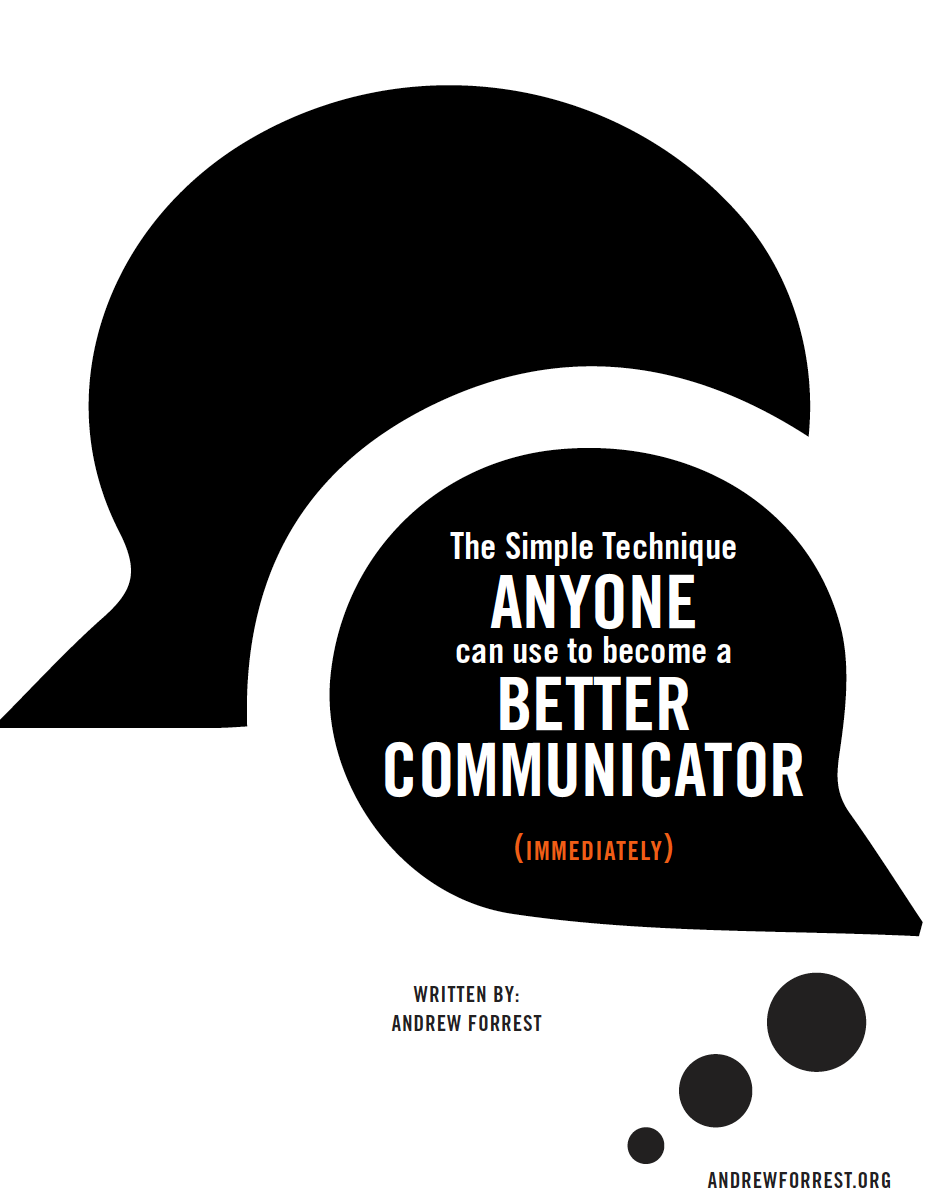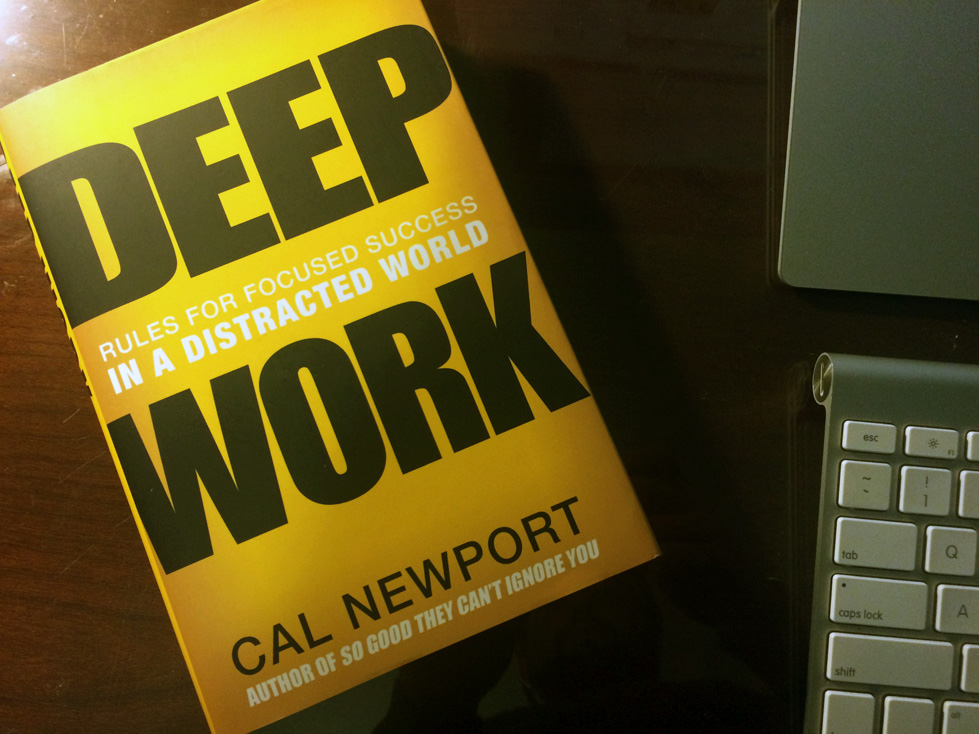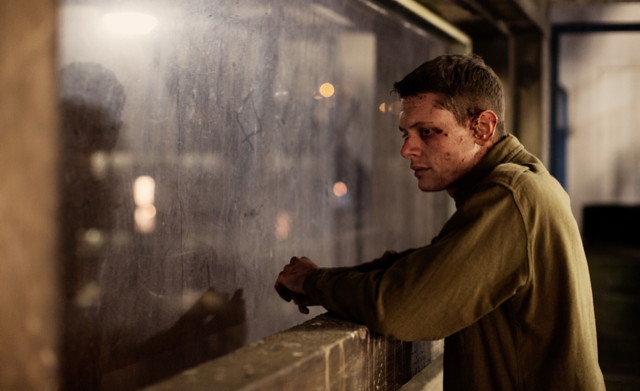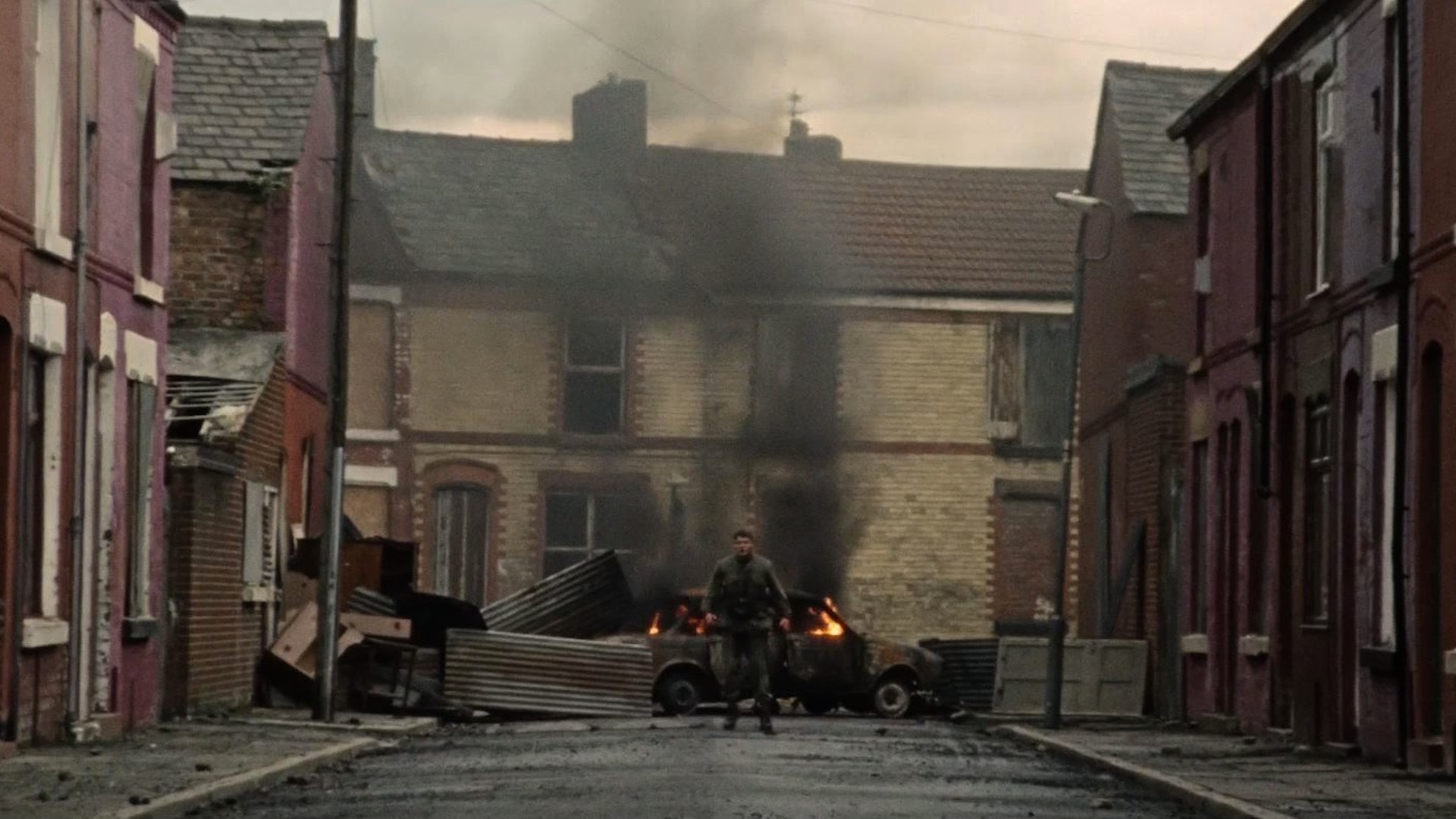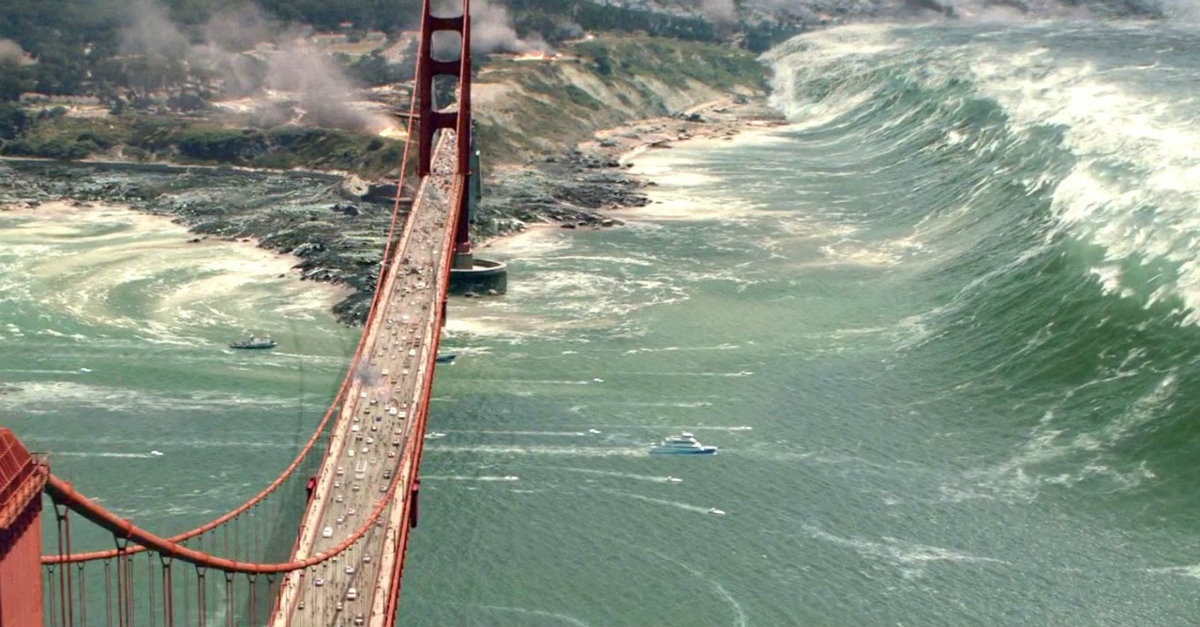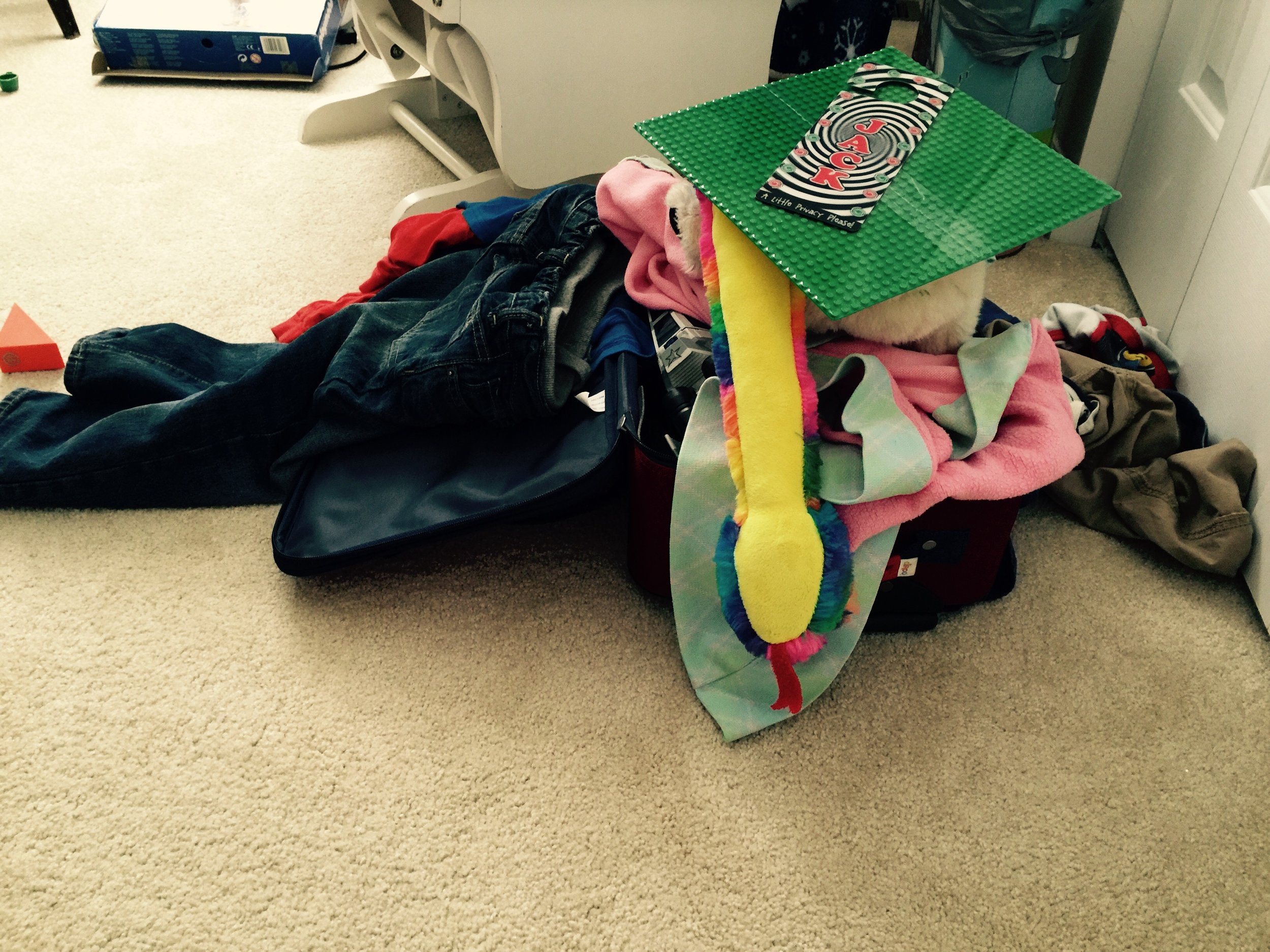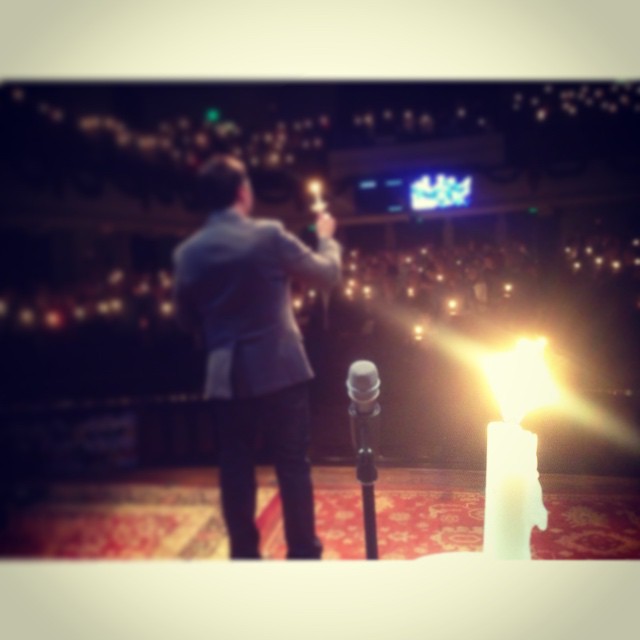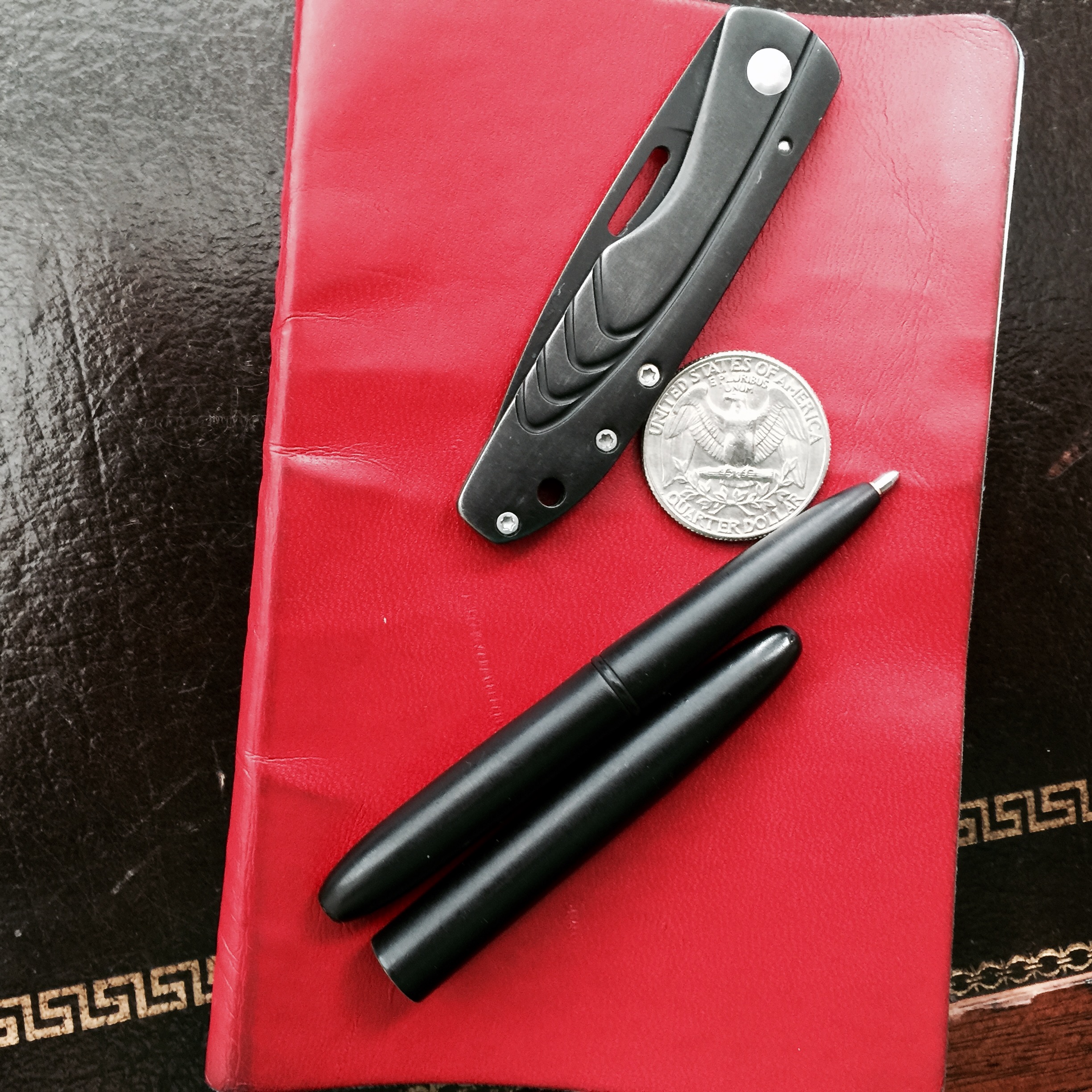I've written a very short whitepaper on a subject I care a lot about: communication.Click HERE to subscribe to my newsletter and I'll send it to you for free:The Simple Technique Anyone Can Immediately Use To Become a Better Communicator.(If you are already a subscriber, drop me a line and I'll send you the whitepaper.)
My 2016 Reading List
I'm almost 2 years late with this post, but better late than never, right? What follows is my 2016 reading list--some great stuff here.
My 2016 Reading Goal
I set a goal to read 50 books in 2016. But, just as in 2013, 2014, and 2015, I fell short: I read 32 books in 2016.
My Rules
I only count books I read all the way through, cover to cover. I read lots of journals and periodicals and online resources, and in my weekly sermon prep read parts of different books and commentaries, but for my reading goal, none of those count. Why not? I find that the concentration and focus required to read a book all the way through is different (and more valuable) than reading a magazine article or blog post or even part of a book, for example. (Also, reading blog posts and articles isn't life-giving to me the way reading a book is.)A book that I keep thinking about months afterward, a book that adds enduring value to my life, that's a book I'll define as good. Since I'm writing this post in 2018, books I rate well below are books that really stuck with me.I use a 5 star system in my ratings to signify the following:★★★★★ life-changing and unforgettable★★★★ excellent★★★ worth readingBooks getting less than 3 stars aren't on my Best list, which doesn't mean they were necessarily bad--just not books that I'd excitedly recommend to you.★★ read other things first★ not recommended
The Best Books I Read in 2016 (in chronological order)
The Rage Against God: How Atheism Led Me to Faith, by Peter Hitchens
Peter Hitchens has become one of my favorite writers, and I try to read everything he publishes. He writes a column for the "The Mail on Sunday" newspaper, and blogs regularly at that site. (His blog is particularly entertaining and informative.) Mr. Hitchens is the brother of the late Christopher Hitchens, a man well-known for his strident atheism. Peter Hitchens, in contrast, had an adult conversion to conservative Anglicanism, and this book is partly a memoir of that journey.Most of the work of Mr. Hitchens has an elegiac quality, a mournful look at the way the world used to be and will never be again. He is too honest and too intelligent to believe that everything about the world of his boyhood is better than the modern world, but also too honest and intelligent to go along with the unthinking modern worship of Progress.★★★★ The Rage Against God
All the Light We Cannot See, by Anthony Doerr
 What I remember most about this lovely novel about a blind French girl during the Second World War is the appreciation the author has for the thingness of things--old-fashioned keys, the oiled tumblers of a lock, the feel of braille on a page, worn carpet on rickety steps. Just as Marie-Laure comes to know the world through senses other than sight, so do we, the readers, experience the reality of her world.I loved this novel all the way up until the final few pages, which I felt were a betrayal of the hundreds of pages that had come before. Still, the best novels create a world that you live within while you're reading, and this one does it.★★★★ All the Light We Cannot See
What I remember most about this lovely novel about a blind French girl during the Second World War is the appreciation the author has for the thingness of things--old-fashioned keys, the oiled tumblers of a lock, the feel of braille on a page, worn carpet on rickety steps. Just as Marie-Laure comes to know the world through senses other than sight, so do we, the readers, experience the reality of her world.I loved this novel all the way up until the final few pages, which I felt were a betrayal of the hundreds of pages that had come before. Still, the best novels create a world that you live within while you're reading, and this one does it.★★★★ All the Light We Cannot See
An Officer and a Spy, by Robert Harris
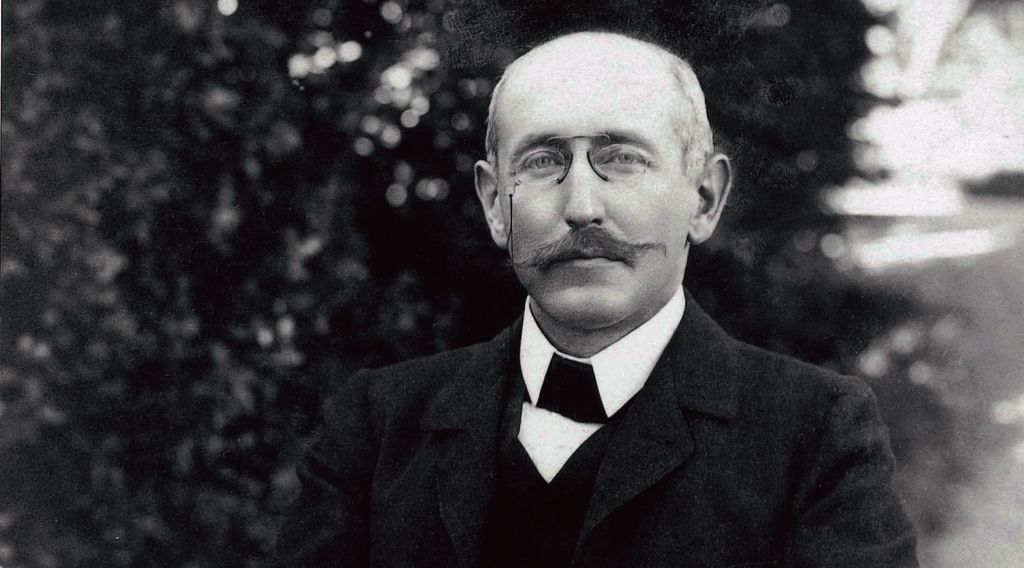 I'd heard about L'Affaire Dreyfus since high school, and I could have answered a trivia question that asked about Emile Zola and J'Accuse, but beyond that I didn't know much of anything about it, other than it involved the French army and nasty anti-Semitism. On a recommendation from Peter Hitchens (see above), I decided to try Robert Harris's historical novel about the Dreyfus Affaire, and I've been thinking about it ever since I read it.The most remarkable thing about this remarkable story is that virtually all of the major and minor characters in the novel were actual historical people. The story is both thrilling, sickening, and fascinating. And, to look back with hindsight and know that within 20 years of the original event France's army would be decimated in the Great War gives the entire story a foreboding quality.(I listened to the audio version of this novel, read by David Rintoul. He is an EXCELLENT reader, and I cannot recommend the audiobook highly enough.)★★★★ An Officer and a Spy
I'd heard about L'Affaire Dreyfus since high school, and I could have answered a trivia question that asked about Emile Zola and J'Accuse, but beyond that I didn't know much of anything about it, other than it involved the French army and nasty anti-Semitism. On a recommendation from Peter Hitchens (see above), I decided to try Robert Harris's historical novel about the Dreyfus Affaire, and I've been thinking about it ever since I read it.The most remarkable thing about this remarkable story is that virtually all of the major and minor characters in the novel were actual historical people. The story is both thrilling, sickening, and fascinating. And, to look back with hindsight and know that within 20 years of the original event France's army would be decimated in the Great War gives the entire story a foreboding quality.(I listened to the audio version of this novel, read by David Rintoul. He is an EXCELLENT reader, and I cannot recommend the audiobook highly enough.)★★★★ An Officer and a Spy
Deep Work: Rules for Focused Success in a Distracted World, by Cal Newport
 Tim Ferriss has this great question he asks the guests on his podcast: "What is the one book you've most gifted--given to other people--in the last year?" For me, one of the books (the other being Rocket Fuel, see below) I've most gifted in the past couple of years is Deep Work. I wrote in greater detail about this book in May 2016, so here I'll just say that though I'm constantly surprised at how few people I know seem willing to do anything about the problems of distraction in our wireless world, maybe that unwillingness will give those of us who are trying to learn how to focus a competitive advantage.★★★★ Deep Work
Tim Ferriss has this great question he asks the guests on his podcast: "What is the one book you've most gifted--given to other people--in the last year?" For me, one of the books (the other being Rocket Fuel, see below) I've most gifted in the past couple of years is Deep Work. I wrote in greater detail about this book in May 2016, so here I'll just say that though I'm constantly surprised at how few people I know seem willing to do anything about the problems of distraction in our wireless world, maybe that unwillingness will give those of us who are trying to learn how to focus a competitive advantage.★★★★ Deep Work
Rocket Fuel: The One Essential Combination That Will Get You More of What You Want From Your Business, by Gino Wickman and Mark C. Winters
 Reading this book permanently changed the way I think about my role as the leader of an organization. The argument in Rocket Fuel is simple: at the top of any organization, there needs to be a partnership between the visionary--usually but not always the point leader--and an integrator, who implements the vision.The book gives some helpful tips for finding out which role you are better suited for, and how to find your counterpart. Very simple ideas, but powerful in practice.★★★ Rocket Fuel
Reading this book permanently changed the way I think about my role as the leader of an organization. The argument in Rocket Fuel is simple: at the top of any organization, there needs to be a partnership between the visionary--usually but not always the point leader--and an integrator, who implements the vision.The book gives some helpful tips for finding out which role you are better suited for, and how to find your counterpart. Very simple ideas, but powerful in practice.★★★ Rocket Fuel
Voyage to Alpha Centauri, by Michael D. O'Brien
 Michael D. O'Brien has become one of my favorite novelists, and this long novel about a long journey to our nearest solar system set in the near future has been rattling around in my mind since I finished it over 2 years ago. O'Brien is not a science-fiction novelist, and this isn't really a science-fiction novel so much as a religious novel: in a secular future, a lonely, irascible scientist is invited to be a passenger aboard the first manned spaceship to leave our galaxy. I found the description of the ship and the technological advances it contains as well as the bureaucratic rigidity and cruelty that the main character faces to be both believable and terrifying. This isn't a perfect novel, and though I'm inclined to agree with this reviewer's criticism here, I actually think it stands up over time. Of all the books I read in 2016, this is the one that has most haunted my thoughts 2 years later.★★★★1/2 Voyage to Alpha Centauri
Michael D. O'Brien has become one of my favorite novelists, and this long novel about a long journey to our nearest solar system set in the near future has been rattling around in my mind since I finished it over 2 years ago. O'Brien is not a science-fiction novelist, and this isn't really a science-fiction novel so much as a religious novel: in a secular future, a lonely, irascible scientist is invited to be a passenger aboard the first manned spaceship to leave our galaxy. I found the description of the ship and the technological advances it contains as well as the bureaucratic rigidity and cruelty that the main character faces to be both believable and terrifying. This isn't a perfect novel, and though I'm inclined to agree with this reviewer's criticism here, I actually think it stands up over time. Of all the books I read in 2016, this is the one that has most haunted my thoughts 2 years later.★★★★1/2 Voyage to Alpha Centauri
Advise and Consent: A Novel of Washington Politics, by Allen Drury
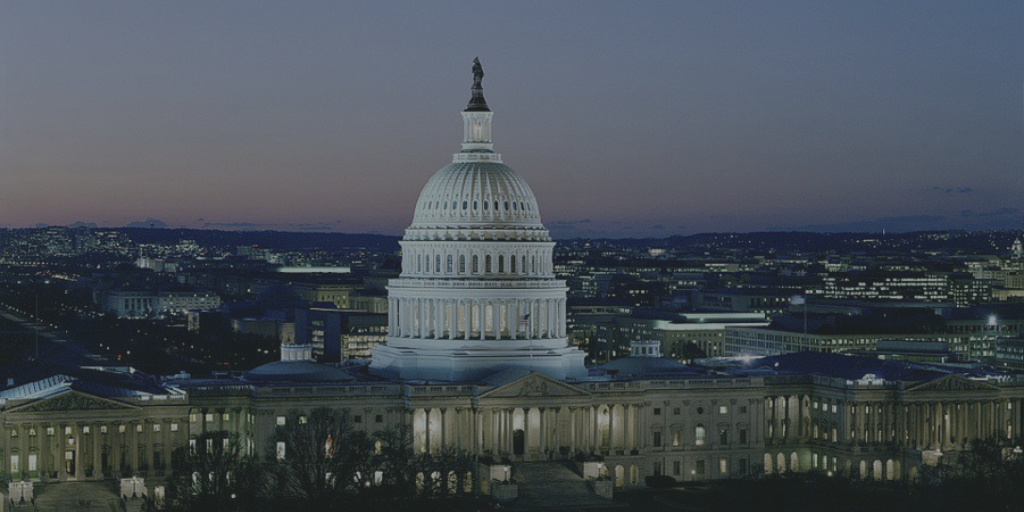 I read this 1959 novel over Thanksgiving break 2 years ago, but I found myself thinking about it constantly during the confirmation hearings for Justice Brett Kavanaugh earlier this fall. Advise and Consent is a long novel about a national political controversy, not unlike the Kavanaugh controversy in that it brings political passions to boil over. It's about what men will do to gain power, and about how ideology causes people to congratulate themselves on their deceit. The central act of the novel is a betrayal that is among the nastiest, cruelest things I've ever read, which has caused me to think about the Presidents in my lifetime--would these men resort to that kind of action? I fear the answer is yes. This is a book for anyone who loves politics (and you'd better love politics, since the book is over 700 pages long); along with Richard Ben Cramer's nonfiction magnum opus What It Takes: The Way to the White House, which I wrote about here, Advise and Consent is one of the best political books I've ever read.★★★1/2 Advise and Consent
I read this 1959 novel over Thanksgiving break 2 years ago, but I found myself thinking about it constantly during the confirmation hearings for Justice Brett Kavanaugh earlier this fall. Advise and Consent is a long novel about a national political controversy, not unlike the Kavanaugh controversy in that it brings political passions to boil over. It's about what men will do to gain power, and about how ideology causes people to congratulate themselves on their deceit. The central act of the novel is a betrayal that is among the nastiest, cruelest things I've ever read, which has caused me to think about the Presidents in my lifetime--would these men resort to that kind of action? I fear the answer is yes. This is a book for anyone who loves politics (and you'd better love politics, since the book is over 700 pages long); along with Richard Ben Cramer's nonfiction magnum opus What It Takes: The Way to the White House, which I wrote about here, Advise and Consent is one of the best political books I've ever read.★★★1/2 Advise and Consent
The Rest of My 2014 Reading List (Some Great, Some Worthless--in Chronological Order)
Silence: A Novel, by Shusaku Endo
An historical novel about Jesuit missionaries to Japan during a time of great persecution in the 17th century, Silence asks the question, Is it right to deny Christ in order to alleviate suffering? I think the novel gives one answer, whereas Martin Scorsese's excellent film adaptation gives a contrary one. I'd recommend both the book and the movie.★★★ Silence
The New Rules for Love, Sex, and Dating, by Andy Stanley
The sermon series on which this book was based was excellent, the book less so.★★ The New Rules for Love, Sex, and Dating
Tortured for Christ, by Richard Wurmbrand
A famous memoir about the evils of Communism and the horrors of Ceaucescu's rule in Romania.★★ Tortured for Christ
Moonfleet, by J. Meade Faulkner
This is an adventure story along the lines of Treasure Island or Kidnapped--though not as good as either--written at the end of the 19thcentury about the south coast of England during the 1750s. A recommendation from Peter Hitchens (see above), it had me reaching for the dictionary, but I loved the antiquated speech of the characters.★★1/2 Moonfleet
Arts and Entertainments: A Novel, by Christopher Beha
This novel made me queasy the whole time I was reading it, and I had to make a commitment finish it. It's about a guy who sells a sex-tape that contains a scene with a now-famous ex-girlfriend. What made me queasy was not the sex-tape (no details are given), but the nauseating sense of celebrity culture and reality television that pervades the novel, and, of course, everyday life. This novel is a satire, and Mr. Beha clearly does not think that reality television is a good thing; nonetheless, I still disliked reading about it.★ Arts and Entertainments
Discovering the Shepherd: a Study of Psalm 23, by G.E. Johnson
The Big Short: Inside the Doomsday Machine, by Michael Lewis
Infuriating, because the people who did the wrong thing got away with it. Interesting portraits of the sort of people who saw what no one else actually wanted to see, even though the evidence was there the entire time.★★ The Big Short
Fight for the Forgotten: How a Mixed Martial Artist Stopped Fighting for Himself and Started Fighting for Others, by Justin Wren & Loretta Hunt
Justin is a friend of mine; the story of his conversion to Christianity and his subsequent adoption by a Pygmy tribe in the Congo Rainforest is one of the more amazing stories I've heard. I'd rate this book higher, but hearing "the Big Pygmy" speak in person has spoiled it for me.★★ Fight for the Forgotten
Reflections on the Psalms, by C.S. Lewis
Great chapters on the violent psalms and on the use of scripture. Really insightful book. Recommended.★★★ Reflections on the Psalms
Dictator: A Novel, by Robert Harris
3rd and final novel in a trilogy about the ancient Roman statesman Cicero. Very creative. Gave me a lot of perspective on ancient Rome, and the fall of the Roman Republic. I liked this, but not as much as An Officer and a Spy by the same author (see above). Certainly worth reading, though.★★★1/2 Dictator
Fifth Business, by Robertson Davies
A very strange novel about the life of a Canadian bachelor. Don't really know if I liked it or not.★★ Fifth Business
Spirituality of Gratitude: The Unexpected Blessings of Thankfulness, by Joshua Choonmin Kang
Simple, holy reflections on gratitude.★★ Spirituality of Gratitude
Unleashing Opportunity: Why Escaping Poverty Requires a Shared Vision of Justice, by Michael Gerson, Stephanie Summers, and Katie Thompson
This is the kind of book in which the authors say things like "Government and church should work together to help children." Okay.... But what does that mean? The only part of the book I found interesting was the chapter on payday lending. Banks usually lend money to people that can pay it back; in payday lending, the whole point is to lend money so that people will never pay it back.★ Unleashing Opportunity
The Power of TED* (The Empowerment Dynamic), by David Emerald
The drama triangle stuff is worth the price of the book, though the little fable is a bit much for me.★★ The Power of TED*
Manage Your Day-to-Day: Build Your Routine, Find Your Focus, and Sharpen Your Creative Mind (99U)
Simple little book. Worth reading for those who are in the creative professions and struggle with distraction. I really liked the ideas of routine. Reminded me of what I already knew (which is not a bad thing).★★ Manage Your Day-to-Day
Team of Teams: New Rules of Engagement for a Complex World, by General Stanley McChrystal, Tantum Collins, David Silverman, and Chris Fussell
I previously reviewed this book. From that review:
Team of Teams is an interesting, thorough book (I've only referenced a very small part of its content here), but I'm not totally convinced by its argument. General McChrystal and his co-authors argue that in our complex world, a great team or team of teams is a greater strategic advantage than a great leader. I agree with that, as far as it goes, and I think the insights in the book about how to create an organizational culture that is adaptable and resilient are helpful. But, I can't help thinking that part of the story of the book is also that it takes a great leader to create that kind of organizational culture. Maybe the kind of leader who could lead that kind of change would end up thriving in any situation, complex or not. The Admiral Nelsons of the world might just make any team successful. A team is important, but a team requires a leader. As Bill Hybels likes to say, 'Everything rises and falls on leadership.' As I said, the more I read General McChrystal‘s book, the more I thought, 'This guy is impressive.'
If You Can Keep It: The Forgotten Promise of American Liberty, by Eric Metaxas
When asked by a passerby in 1787 what the Framers of the Constitution had been creating on behalf of the American people, Ben Franklin replied "A republic, if you can keep it." I strongly dislike both the Bonhoeffer and Luther biographies by Metaxas--I can't stand his writing style--but I really liked this little book about America. Highly recommended.★★★ If You Can Keep It
The Chimera Sequence, by Elliott Garber
Look up "Beach Read" in the dictionary, and this novel about mountain gorillas and terrorists and heroic scientists would be pictured.★ The Chimera Sequence
Laurus, by Eugene Vodolazkin, trans. by Lisa C. Hayden
After reading Rod Dreher's rhapsodic review of this modern Russian novel, I wanted to like it...but I just didn't. I thought it was okay and interesting, but nothing close to as good as he seems to think.★ Laurus
Streamline: How to Create Healthy Church Systems, by Michael Lukaszewski
★★ Streamline
Leadership Axioms, by Bill Hybels
One of the many sad parts of the Bill Hybels situation this year is that Bill was someone with good stuff to say...if only he would have applied it to himself. This is a good book, regardless of its author's hypocrisy and failings.★★★ Leadership Axioms
With: A Practical Guide to Informal Mentoring and Intentional Disciple-Making, by George G. Robinson and Alvin L. Reid
I remember literally nothing about this book.★ With
The Checklist Manifesto: How to Get Things Right, by Atul Gawande
Really interesting case studies (aviation, surgery, etc.) of the usefulness of checklists.★★ The Checklist Manifesto
Werewolf Cop: A Novel, by Andrew Klavan
Yes, I actually read this. And no, I have no idea why.★ Werewolf Cop
Red Moon Rising: Rediscover the Power of Prayer, by Pete Grief and Dave Roberts
I heard Pete Grieg give a talk at a conference, and so I bought this book. Wasn't particularly helpful to me, though I was struck by the 24-7 Prayer emphasis.★ Red Moon Rising
The Simple Technique Anyone Can Use To Become a Better Communicator (Immediately)
"Annihilation"--Book Review
I finished the Jeff VanderMeer science-fiction/horror novel Annihilation last month; the movie opens this week. [No spoilers below, by the way.] I?d seen the trailer for the movie online and was intrigued by the BASED ON THE ACCLAIMED BEST-SELLING NOVEL? title that flashes across the screen, so I put the novel on hold at the library. (I?d not heard of it previously.) My verdict, now that I‘ve read it? If the movie Annihilation?is anything like the novel?Annihilation,?it will be STRANGE.The novel begins in medias res as a team of four women?each unidentified, except for her title: psychologist, anthropologist, surveyor, and our narrator the team biologist?begin to explore a wild coastal wilderness known as Area X. Area X is beyond a mysterious border that requires the women to have been hypnotized to pass through it; the team‘s mission is to research the area and report back to some mysterious agency called The Southern Reach. Almost immediately, the team stumbles across a mysterious underground tower,? the top of which begins at the earth‘s surface. The entrance leads to a spiral staircase that continues underground. The team explores the tower, and below ground, in the dark, they discover a long stream of words running along the wall. The string begins
Where lies the strangling fruit that came from the hand of the sinner I shall bring forth the seeds of the dead to share with the worms that?.etc.
The biologist comes close to the words and discovers that they are in fact a living organism or organisms, perhaps some type of fungus. They return to the surface, and strange things begin to happen.Or, at least, strange things are implied and occasionally shown. The strangeness of the novel slowly increases the more you read, because the characters in the midst of the strangeness don't seem to be overly bothered by it, which I take is the effect the author was going for: the very fact that everyone in Area X takes its increasing weirdness in stride is a clue to us that the entire situation is uncanny. We wonder, What‘s wrong with these women? Why is our narrator so matter-of-fact in describing a situation that is so utterly bizarre?The novel in fact is so bizarre that I finished it and had to ask myself, What was this about?Now, you should know that almost none of the scenes in the movie trailer is actually in the novel, but if you're planning on seeing it, expect it to be?weird. And let me know if you figure it out.
All the Cool Kids are Meditating, Man
I was just listening to the Brian Koppelman interview on Tim Ferriss's?Tribe of Mentors podcast, when one of Koppelman's answers struck me. The?Tribe of Mentors podcast is billed as "short life advice from the best of the best," and in it Ferriss asks his guests a series of standard questions, in a much shorter format than on his more well-known?The?Tim Ferriss Show podcast. One of the standard questions (a really good one) is:In the last five years what new belief, behavior, or habit has most improved your life?Here is Brian Koppelman's answer (beginning at 10:52 in the podcast):
"I know many of Tim's guests say this, and the answer is: meditation. For me, I do transcendental meditation, and I do it every day for twenty minutes, two times...first when I wake up in the morning, and then around 3, or 4, or 5, or 6 in the afternoon. And what I have found is that doing this mediation--taking this time--has drastically decreased the physical manifestations of anxiety and it has given me far more clarity and far more peace."
Some quick thoughts:
- ?He's right: many of Tim Ferriss's guests on this podcast and on the?Tim Ferriss Show talk about meditation. These folks often tend to be Silicon Valley/Hollywood/Venture Capitalist types, and they often mention how meditation has been a helpful practice to them.
- Because these folks are Silicon Valley/Hollywood/Venture Capitalist types--"California" in mindset, if not location--their practice of mediation tends to be "spiritual and not religious" in a New Age vein.
- It shouldn't be surprising that spending time quieting the mind and the soul brings helpful benefits. This shouldn't surprise us because people have known this for literally thousands of years, in every culture that I know of.
- It's almost as if we were created a certain way, and certain practices--independent of time and place, across all cultures and centuries--just produce good things in people's lives....
- Maybe human nature isn't plastic; maybe wisdom is not making yourself what you want to be, but rather making yourself fit the world.
- If the same folks on Tim Ferriss's podcasts had kept saying "prayer" instead of "meditation," they wouldn't seem nearly as cool, would they? Prayer is boring; meditation is cool.
- We're a culture that's forgotten what we used to know, and so we grab various life-giving practices out of the heap, but because we've forgotten what we used to know (like the folks in the Foundation in the Isaac Asimov novels), we're not able to use them to their full benefit.
- I recently heard Robert Barron say something interesting about prayer:
"Please don't think of prayer as something that God needs: God doesn't need your prayer, doesn't need my prayer. It's not like we're in this sort of pagan thing, where 'unless I get this much done, God's not going to do something'--don't think of it that way; he's not a 'pasha' that we're trying to impress with our supplications--prayer is for you, prayer's good for you, it's not good for God. God loves it because it makes you better and happier. It's not for God's sake, it's for your sake."
- The difference between Christian prayer and meditation seems to me to lie primarily in what you believe about ultimate reality: meditation is about quieting your heart and mind so you can experience the inner peace that comes from becoming more in tune with Reality, whereas prayer in the way and name of Jesus is about a relationship with the Person behind all reality. In the Christian tradition (and Jewish tradition, for that matter), Reality is not impersonal at all.
- The unique insight of the gospel is that Reality is a Person, and he's made himself known to us in the manger.
- Christians believe that God is Love. That beautiful idea is popular, but think about it: love requires personhood--love cannot be impersonal. Meditation is a good thing, but I don't think it can lead to love in the same way that prayer can, because prayer is about coming to know the source of Love itself, and his name is the LORD.
Anyway, it just struck me that many of the world-class performers that Tim Ferriss has interviewed have mentioned mediation. (Though I don't think I've ever heard a single one of them mention prayer.)
Brief Thoughts on Voting
I was at my polling place (a beautiful old church in East Dallas) 10 minutes before the polls opened this morning, and there were already 10 people in front of me. Voting always makes me?reflective, and here are some of my thoughts and reminiscences, in no particular order. The sacred solemnity of peaceful voting always strikes me. There is just something about being surrounded by my fellow citizens, who may or may not share my beliefs, as we all line up peacefully and patiently to cast our votes. There is just something sacred about walking into the voting booth as a free man. I think voting represents America much better than fighter jet flyovers at NFL games--that's just a show of power: our real power lies in the peaceful ritual of?Election Day.Nothing is more important than the peaceful transfer of power. There are lots of issues I feel very strongly about, issues I believe matter to God. But I don't think anything matters more than the peaceful transfer of power. This 229 year-old experiment we have with our Constitution is exceeding rare in human history, and unless we are governed by laws with a peaceful transfer of power, nothing else is possible. I lived in West Africa as a small boy, and I distinctly remember watching from the verandah of our house, which was perched on the side of a small mountain, and looking down at the capital city below as the sirens sounded and soldiers shouted: there had been a coup attempt. Nothing is more destructive than chaos. May our system continue long into the future.God bless the election volunteers. I remember the first time I voted (must have been November, 1998). I was home from college and I went with my dad up to our polling place, which was a school I'd attended. In the 1950s era gymnasium/auditorium/cafeteria, we checked in with the volunteers and I was surprised to see I knew all of them--they were ladies from our church. I was impressed then with their civic commitment, and I have been impressed with election volunteers ever since. These people make our freedom possible.The longest line I ever waited in to vote was in 2004. I was living in Richmond, Virginia, off of Monument Avenue. I went to vote around midday, and the line wrapped around the city block. No one complained.It is shameful that I don't know more about the down ballot races and propositions. I am an educated guy. I read the newspaper every day. I care about local issues. And yet there were a few races on my ballot this morning that I knew nothing about. There was also a long and complicated proposition having to do with the pension fund for civilian city employees. I was mortified to read it and realize?I didn't know what I should do. I left it blank. That is unacceptable. I never want to be in that position again. It is my responsibility to be?more informed.But it is also shameful how our media don't prepare us for these important races and issues. I have a good memory and a varied media diet, and yet I walked into the voting booth knowing very little about issues beyond the headlines involving our leading presidential candidates. I know that there may not be a market for journalism devoted to issues, particularly down ballot issues, but I still think it's shameful how little space our media devotes to anything other than the presidential horse race.I wonder if a variation of the "Bradley Effect" will play a role in this election. The Bradley effect derives its name from the 1982 candidacy of Tom Bradley for governor of California. Mr. Bradley, a black politician, was ahead in the polling before the election, but lost the actual election. Why? Political scientists concluded that potential voters were not?honest with pollsters, telling the pollsters that they were going to vote for a black man (the socially acceptable answer), while not actually doing so in the privacy of the voting booth. I wonder if the same thing might happen today with regard to Mr. Trump--are there people who will privately vote for him, even though they'd be embarrassed to say so publicly?I don't know why cell phones are banned at polling places, but I'm glad they are. In Texas, cell phones and other "electronic communications devices" are banned within 100 feet of voting stations. I don't really see the problem with a ballot selfie, but I'm not complaining.Finally, the Presidency isn't going to save us, and our future will not depend on tonight's results. I believe it matters whom we elect--I want good people serving in office, from dog catcher on up to President of the United States. But, our ultimate hopes do not lie with our politicians, and the church does not depend on politics to carry out its mission; our hopes lie with God, and the church depends on him.In other words, Jesus is Lord, today, tomorrow, and forever.
The fox knows many things;The hedgehog knows one big thing.Click?here‘to subscribe to regular updates from this blog.
In Praise of "Deep Work"
As focused attention becomes rarer and rarer in our distracted culture, the people who cultivate focused attention will find themselves becoming more and more valuable. In other words, you can't afford NOT to be doing deep work. This is the thesis of the book Deep Work: Rules for Focused Success in a Distracted World by Cal Newport, a book that I cannot recommend highly enough. Here's why.
Deep Work: A Definition
Cal Newport, computer science professor at Georgetown University, defines deep work in this way:
Deep Work: professional activities performed in a state of distraction-free concentration that push your cognitive capabilities to their limit. These efforts create new value, improve your skill, and are hard to replicate.
In contrast with deep work is shallow work:
Shallow Work: noncognitively demanding, logistical-style tasks, often performed while distracted. These efforts tend to not create much new value in the world and are easy to replicate.
Most knowledge workers spend most of their time engaged in shallow work--email, anyone--so that, though they may be busy, they are not productive.The people who are writing the best-selling books, making the blockbuster movies, creating the irresistible advertising campaigns, winning the major tournaments, and leading the market-beating companies, these are the people who are doing deep work (whether they realize it or not). Deep work makes a difference.
The Deep Work Hypothesis
The prevalence of shallow work in our culture leads to Newport's deep work hypothesis.
The Deep Work Hypothesis: The ability to perform deep work is becoming increasingly rare at exactly the same time it is becoming increasingly valuable in our economy [and becoming valuable because it is becoming rare--AF]. As a consequence, the few who cultivate this skill, and then make it the core of their working life, will thrive.
Newport also argues that deep work actually makes people happier. As someone who has certainly spent a day being busy without being productive, I know that he's right: I'm happier when I'm able to focus.So, if you want to thrive in our knowledge work economy and if you want to be happier while doing it, you need to learn how to do deep work.
The Deep Work Rules
Newport has come up with what he calls The Rules of Deep Work.
- Work Deeply
- Embrace Boredom
- Quit Social Media
- Drain the Shallows
1. Work Deeply
Deep work is something we can learn how to do. Focused attention is not something you can just turn on or off--it's something that must be trained and cultivated, like a muscle. Just as someone who spends his time sitting on the couch eating Doritos and watching television cannot overnight become a marathon champ, neither can someone who spends his time like that be immediately good at deep work. Deep work requires practice and planning.
2. Embrace Boredom
Internet tools (social media, on-demand video, infotainment sites, etc.) have taught our minds to need constant stimulation, but deep work requires focused attention, and our need for shallow stimulation will undermine our ability to do deep work. Therefore, we need to embrace boredom. It's good to resist the urge to pull out your smart phone when waiting in line at the post office: our minds need boredom.
3. Quit Social Media
You knew this was coming, right? Newport makes the argument that people who are actually producing deep work (best-selling authors like Michael Lewis, e.g.) produce deep work because they do not allow themselves to be distracted by social media. I know lots of people believe that social media is like alcohol--to be used and enjoyed in moderation. I wonder, though, if social media is more like heroin: addictive and distracting for everyone. (UPDATE: In conversation, I could say something provocative like that and you'd understand from my jocular tone what I was trying to convey, but I realize that, if you just read those words, they come across differently. My church actively uses social media (and I use it, too) and I have many friends who work in social media marketing; if I really believed that social media was the same thing as heroin, I'd stop using it immediately. I think social media marketing is necessary in our culture. My point is just that I think all of us are much more easily distracted than we want to admit.)
4. Drain the Shallows
By "drain the shallows," Newport means that we should aggressively eliminate the non-essential from our working lives. For example, he gives practical tips on how to cut down on email, a major source of shallow work for most people.
Why I Need This Book
About 45 times a year, year after year, my professional responsibilities require me to create a brand-new, relevant, engaging, and faithful presentation and then deliver it in front of an average live audience of about 1,000 people, each one of whom is judging me savagely (even if they seem to be nice people!) on that presentation. In addition to that, I also create multiple smaller presentations and essays through the year that also need to be original, relevant, helpful, and faithful. In our distracted world, it seems as if everything but the truly important is screaming LOOK AT ME! PAY ATTENTION TO ME!, and so I've come to the following conclusion:
if I don't learn to do deep work, I'm not going to make it.
Deep Work is one of the most insightful, practical, and challenging books I've read about work and creativity...maybe ever. I cannot recommend this book highly enough.★★★★ excellent
Note on My Rating System
I use a 5 star system in my ratings to signify the following:
★★★★★ life-changing and unforgettable★★★★ excellent★★★ worth reading★★ read other things first★ not recommended
Click here to subscribe to updates from this blog. (I'm sure Cal Newport would approve.)
Further Thoughts on Facebook
I wrote a post last week suggesting that, in its quest to capture our attention, it's almost as if Facebook wants our worship. I meant the post to be provocative, and at least for me, it was: the post has provoked some further thoughts, which I share below.
My Name is Andrew and I'm a User
I have a Facebook account and a Twitter account, I use YouTube, and I carry around an iPhone that enables me to be connected whenever I want. It's precisely because I'm a user that I'm concerned about what Cal Newport calls "Internet tools" (search engines, social media sites, online encyclopedias, etc.): I see their effects on my own life. It is because I've seen what these tools are doing to me that I'm calling into question our naive and uncritical adoption of Internet tools.
Facebook Is Shorthand
For me, Facebook functions as shorthand for all the other Internet tools. I don't have anything against Facebook?per se.
Social Media Is Different Than Television
One commenter wondered if I should have included television in my critique. I don't think television and Facebook are apples to apples, for several reasons:
- Television goes in one direction only: I receive it. Facebook, on the other hand, allows me to transmit messages to the world, and the very act of transmitting those messages in that medium promotes narcissism: it's all about me.
- Television isn't one‘thing, but a grouping of many things: networks, advertisements, writers, actors, etc. Facebook is a for-profit monolith. It's ubiquity and power make it more dangerous than old media.
Social Media?Promotes Narcissism
The very nature of the social media promotes narcissism, because they encourage me to make everything about me: my updates, my likes, my reactions.
Social Media Isolates
For all the talk about connectivity, I find that social media and the other Internet tools are more likely to isolate than connect us together. The more time we spend looking down at our blinking smart phones, the less able we are to cultivate presence and mindfulness.
Social Media is the Enemy of Patience
Everything about Internet tools is about immediacy: immediate reactions, thoughts, and gratification of desires. If I want something, I buy it on Amazon; if I have an opinion about a current event, I share it to the world. This immediacy keeps us from developing the virtue of patience, and patience matters because the important things in life require that we wait.
Social Media Trains Me to Need Constant Stimulation
It is shameful how often I find myself in a line somewhere, only to pull out my iPhone. The way Internet tools have trained us to need constant stimulation is what scares me the most about these tools.
Social Media is the Message
If the medium is the message, then it's not the content of the various social media platforms that ought to worry us, but the very nature of these platforms themselves. In other others, it could be the case that even if we eschew all the destructive and evil things on the Internet (pornography, terrorist death videos, etc.), these tools might still warp our minds and twist our wills.At least, that's what I've started to worry about.
Click?here‘to subscribe to updates from this blog.
In Praise of SNL's Kyle Mooney and Beck Bennett
Kyle Mooney and Beck Bennett are the funniest, smartest comedians to be on Saturday Night Live in a long time. (At least, that's my humble and accurate opinion.) They both have a great ear for the ridiculous and a talent for satire that's not cruel. Here are some examples of their work.
Reality House
We've come to take it for granted, but, as Kyle and Beck's deadpan voice-overs and bogus one-on-ones with the camera make clear in this sketch, reality television is a ridiculous, boring genre. (I love the furniture-throwing at the end.)[embed]https://www.youtube.com/watch?v=rnEiMaqQL4I[/embed]
Cool (with Ryan Gosling)
I think my favorite part of this satire of Friday evening 90's network sitcoms?is Kyle Mooney's flat "Doug?" voice and the laughtrack. (Ryan Gosling is a great 3rd man.)[embed]https://www.youtube.com/watch?v=a6I9u3wjn-A[/embed]
March Madness (Ariana Grande)
This is one of those completely silly skits that just works because of the earnest stupidity of Kyle and Beck. My 6 year-old thinks it's hilarious, and I agree. (It doesn't hurt that Ariana Grande is one of those celebrity guests who knows how to play the straight man.) My son's?favorite line: "And we'll bring the FROGS!" My favorite line: "We'll probably just bring 'em."[embed]https://www.youtube.com/watch?v=Dm1xYZp2GXo[/embed]
Mr. Riot Films
Here's my question: is the man with the hardhat a plant, or did they actually ambush him?[embed]https://www.youtube.com/watch?v=6XIQBeqL7kM[/embed]
Kyle vs. Kanye
I think the self-involved and self important emotional tone is just?perfect.[embed]https://www.youtube.com/watch?v=Sgs81IOU0m4[/embed]
Comedy Club
The eyeroll and then the teary-eyes--it's so painful and so funny.[embed]https://www.youtube.com/watch?v=ZWMlr11pJow[/embed]
Baby CEO
Are his movements perfect, or what?[embed]https://www.youtube.com/watch?v=KxbG0WtNKNs[/embed]Love these guys.
Click?here‘to subscribe to updates from this blog.
(Old Testament Law on Friday, Saturday Night Live on Monday. Fox and hedgehog, remember....)
Best of 2015
The editors at www.andrewforrest.org (best blog on the internet?)?have been working long hours and our fingers to the bone to get our 1st annual best-of list together. Yes, we didn't make it by 12/31, but it's not too late to look back at 2015, right?
Best Book I Read in 2015
The Amazon description calls Kristin?Lavransdatter?"the turbulent historical masterpiece of Norway's literary master." I agree that it's a masterpiece (though certainly an overlooked one): Sigrid Undset's 1100 page historical novel is a book that will stay with me for years to come. It's about the life of the title character in 14th century medieval Norway, and I can honestly say I've never read anything like it. Highly recommended.
Best Movie(s) I Saw in 2015
Here's what?I wrote in April about the brutal war thriller?'71:
Walking down the stairs of the theater afterwards, I realized that I?d been keeping my entire body rigid and tense throughout the movie?it‘s that kind of film. It‘s really well done: terrifying, honest, brutal, and resists the urge to clean-up everything at it‘s end. Highly recommended, though not for the faint of heart."
Thinking back on it 9 months later, I stand by that assessment. '71 is one of the best movies of the year.
Meanwhile, on the complete other end of the movie spectrum....
On the complete other end of the spectrum, the British claymation film?Shaun the Sheep: the Movie?is also one of my favorite movies of the year. It's wordless, really funny, and touching and sweet as well. Recommended.
Best Reason Not to Visit Seattle
Kathryn Shultz wrote a long article in?The New Yorker's July 20 issue called "The Really Big One,"?about how the Pacific Northwest is overdue for a massive earthquake. One of the memorable quotations from the piece comes from the region's FEMA director when he says (and subsequently stands by his remarks): "Our operating assumption is that everything west of Interstate 5 will be toast. Her follow-up piece 8 days later addressing some FAQ's won't make you feel any better.
I'll stay in Texas, thank you.
Best App
My wife and I made a decision to never share pictures of our son on social media. However, our extended family is far-flung and lives on 3 different continents, and sharing pictures is an important way to feel closer. Enter?Togethera, a photo sharing app that allows you to create closed groups. We've been using it since the summer and love it.
Best Sermon
That's like asking me to choose which one of my kids is the best. The answer is obvious: I like them all, except the ugly ones.
Best Everyday Carry Accessories
I never leave the house without the following in my pants pockets:
- a pocket notebook (which I keep in my back pocket);
- my space pen;
- and my trusty ole?pocketknife.
Best State Fair
 Too easy:?The State Fair of Texas, fool! (September 30 will be here before you know it....)
Too easy:?The State Fair of Texas, fool! (September 30 will be here before you know it....)
Finally: Best Hanukkah Song
I know, I know: with so many to choose from, how do you narrow it down to just one? But, this year's winner (which, being held hostage by our house's resident kindergartner, we played on repeat in our household 1,000 times in the month of December) is Jewish reggae?rapper Matisyahu's 2012 single "Happy Hanukkah." The video ain't my favorite, but I defy you not to be happy with the audio turned way up.[embed]https://www.youtube.com/watch?v=K1QRSl6hUZw[/embed]My favorite part is the "Lion of Juuuuudah" part of the refrain.
Auld Lang Syne
2015 was a great year; here's to an ever better 2016.
(To ensure you have a great 2016, click?here‘to subscribe to my blog updates, delivered right to your inbox 3 days a week.)
What I Read
What do you read on a regular basis? We are what we eat, and that includes the words we consume. Today's post (part 3 of a 3 part series) is about the magazine, journals, and books that make up my media diet.
Print Subscriptions
In addition to?The Dallas Morning News (mentioned in part 1),?I subscribe to the print editions of the following periodicals:
- First Things,?a magazine founded by the late Father Richard John Neuhaus that, while including Protestant writers as well, tends to come at things from a conservative Roman Catholic perspective. First Things is hit or miss for me: some of the long essays are just first-rate, while others are either over my head or boring.
- The Atlantic, a magazine that I've been reading since I was in middle school and that used to be much better than it is. (I guess I subscribe out of loyalty.) In the 90s and early 2000s when Cullen Murphy and then Michael Kelly (who was killed in Iraq in 2003) were editors and William Langesweiche and James Fallows were writing frequent longform pieces for the magazine and Benjamin Schwartz (especially Benjamin Schwartz!) was editing the Books section,?The Atlantic was one of my favorite magazines. I'd receive a copy in the mail and read the whole thing, almost in one sitting. In recent years, though, The Atlantic (founded in 1857!)??has seemed to me to foolishly chasing "relevance" and adopting the perspective of the sort of 25 year-old secular graduate student in the humanities who gets his wisdom from?The Daily Show. (This is not a perspective I share, if you couldn't figure that out.) Although The Atlantic published‘some great longform pieces from time to time, I get each new copy of the magazine out of the mailbox with much less enthusiasm than I did 20 years ago.
- Outside,?a glossy adventure magazine. I wish?Outside devoted more space to book reviews, as I've ready some really excellent novels the past couple of years that I first read about in?Outside, e.g.,?The Dog Stars and?The Abominable.
- Texas Monthly, which has enough ads to fill JerryWorld?, but also includes in each issue something I find worth reading about my adopted home state.
- Plough,?a small Christian journal that, while ecumenical, draws on the Anabaptist tradition.
- Books and Culture,?a newspaperish magazine that covers, from an evangelical perspective, exactly what the title suggests. Like?First Things,?Books and Culture?is hit or miss for me, but I recently resubscribed because I really believe in its mission.
- The American Conservative, a magazine that I discovered from reading Rod Dreher's blog. I don't know of any other place online or in print that is similar to?TAC: small c conservative, isolationist, contrarian, and realist. (I was pleased when Benjamin Schwartz, whose work at?The Atlantic I referenced above, joined?TAC last year as national editor.) For a good example of the kind of stuff?TAC covers that no one else does, see this piece from April on suburban sprawl and walkable cities called?"Cities for People--or Cars?".
The Dallas Public Library
Where would I be without a good public library? Well, I'd have a lot more shelf space, that's for sure. Here is my current library shelf in my home office: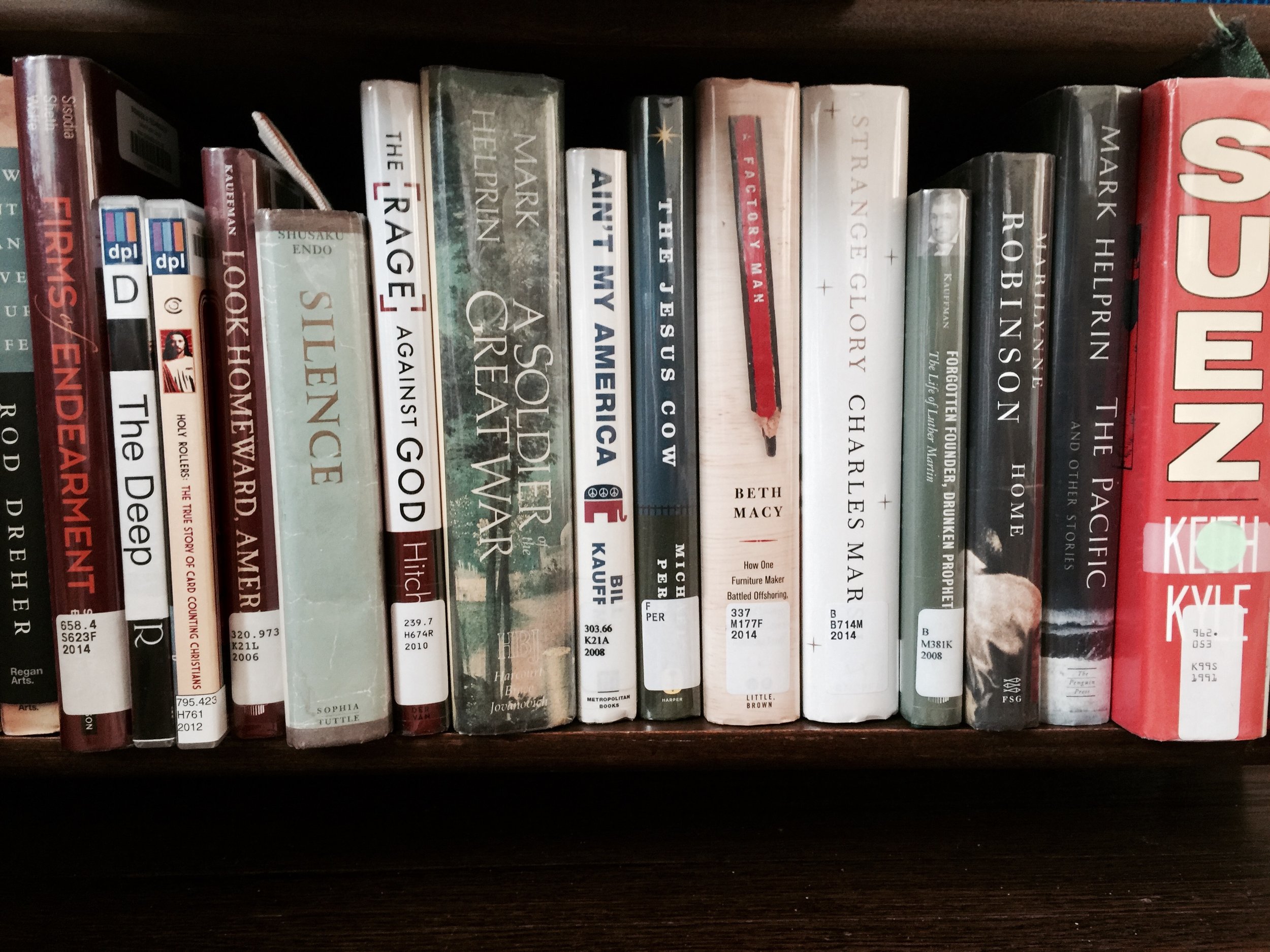 Don't be impressed--I have a habit of hearing about a book, placing it on hold at the library, and then stockpiling a bunch of great books I haven't yet and probably won't ever read.
Don't be impressed--I have a habit of hearing about a book, placing it on hold at the library, and then stockpiling a bunch of great books I haven't yet and probably won't ever read.
And Most Importantly, Real Books!
I love reading, and I love reading physical books. I have aKindle and I use the Kindle app for iPhone; I like the way I can quickly annotate an ebook. But, despite the convenience of the ebook, I still think the regular old book is a pretty great form of technology, and reading a good book can quiet my mind better than just about anything else.I read books on theology and leadership for my job, but what I really like reading are books on history and especially long novels. I try to vary up the books I read: something on one topic, and then something completely different. (As an example of something really different, I read a very long novel this summer, completely unlike anything else I've read in years:?Kristin Lavransdatter, Sigrid Undset's 1100 page masterpiece about a woman living in 14th century Norway, and one of the best books I've ever read.)
In Conclusion: I Need to Make Some Changes
As I've been thinking about my media diet these past few weeks, I've once again been confronted with the fact that I fritter away too much of my time on unimportant online content that cuts into my time and ability to read books that matter.My goal is to read 40 books this year, which would be more than I've managed in the previous 2 years. My current total: 29.Maybe I need to stop watching so much?Arrested Development.
P.S. Subscribe
If you've read this far, why don't you go ahead and subscribe to my blog? I supposedly post 3 times a week, though I've been posting less frequently recently. Click here to subscribe.
My A/V Media Diet
What do you watch and listen to on a regular basis? We are what we eat, and that goes for the information we consume. Today's post (part 2 of a 3 part series) is about the sources that make up my Audio/Visual media diet.
Audio Subscriptions
I have been a devoted listener and subscriber to?The Mars Hill Audio Journal?since 2003. Ken Myers, from Charlottesville, VA, has created an audio journal that is exactly opposite everything our popular culture embraces: his interviews are long, unconcerned with the latest and loudest, and deeply concerned with the deep questions that humans have been asking for millennia.The name of the?Journal comes from Acts 17, where the Apostle Paul goes to Mars Hill in Athens and interacts with the pagan philosophers on their own terms.
Podcasts
- The Eric?Metaxas Show,?which features Eric Metaxas and his wide variety of guests;
- Andy Stanley Leadership Podcast;
- Munger?Place Audio Podcast: though it's painful for me to listen to my own sermons, I still do so from time to time because I know that hearing myself helps me become a better preacher;
- Fresh Air:?Half the time I'm either completely uninterested in Terry Gross's interviews or else in complete disagreement with her perspective, and the other half of the time I'm captivated by the long-form interviews featured on Fresh Air;
- In Our Time, a long-running radio show on the BBC hosted by Melvyn Bragg, who interviews British academics to talk in detail about history, science, etc.
- This Is Your Life with Michael Hyatt. I liked the earlier version of this podcast better than the current episodes, but from time to time I still benefit from Michael Hyatt's insights on productivity and leadership.
Television
I don't watch much television these days and we don't have cable. When I do watch TV, it's mainly with my family and mainly on Sundays: NFL football, 60 Minutes, and America's Funniest Videos. As a family, we also watched American Ninja Warrior on Mondays this summer.I've watched every episode of?Arrested?Development multiple times (via Netflix and Hulu), and, until Netflix took it off the air, would also rewatch?Fawlty Towers. (This watching of the same shows over and over again drives my wife crazy.)
Social Media
I reluctantly use Facebook for my job because it helps me stay connected with people in my congregation, and it helps me remember names. On the other hand, I've been an enthusiastic user of Twitter: I like the ways it allows me to follow lots of really interesting people.However, as I wrote about a few weeks ago, in early summer 2015 I deleted both the Facebook and Twitter apps from my iPhone and I haven't looked back. I still use Facebook from time to time, but I've essentially not read anything on Twitter for over 3 months.
Audiobooks
I love audiobooks, and in the last year have been using the Overdrive app from the Dallas Public Library, which allows you to check out audiobooks from your local public library. (I have to be honest, though, and tell you that I miss books on tape. Those were the days.)
Coming in Part 3
The final installment in this series will run next Monday and will be about I subscribe to and read in print: books, magazines, journals, etc. (Click here to read part 1, about my online media diet.) The above was what I listen to and watch on a regular basis.What about you? What sources make up your A/V media diet?
P.S. Subscribe!
If you've read this far, why not subscribe for updates from my blog? I supposedly post 3 times a week on Mondays, Wednesdays, and Fridays (I say supposedly because it's been much less frequently recently). Click here to subscribe.
My Daily Media Diet
What are the books, podcasts, websites, blogs, and newsletters that make up your media diet? You are what you eat, and that includes the information you consume. Today's post is about what I read daily as part of my media diet (part 1 of a 3 part series).
What Is a "Media Diet?"
"Media diet" is a phrase I came across several years ago in a web series by?The Atlantic. A reporter would interview public figures about how they stayed informed and what they regularly read and watched and make a simple post out of it. (I still remember Malcolm Gladwell's comment about his daily reading habits:?"Since my brain really only works in the morning, I try to keep that time free for writing and thinking and don't read any media at all until lunchtime." I totally identify....)In part 1 of this series (parts 2 and 3 coming on the next two Mondays) about my media diet, I'll focus on what I read daily (or at least regularly).
What I Do First Thing in the Morning
I've written before about the importance of the First 15, i,e., spending?at least the first 15 minutes of your day in prayer, scripture, and silence. So, I've been getting up really early recently in order to have an unhurried time of prayer first thing, before I workout.Currently this is what I use in my prayer time:
- the NRSV Thinline Bible I was given by the bishop at my ordination;
- the scripture reading calendar my church gives out through our?Eat This Book program;
- Seedbed's Field Guide to Daily?Prayer (I really like the 30 day- reading plan for the Psalms);
- and a small journal that I write in about once a week or so.
Breakfast:?The Dallas Morning News and NPR
After working out and while eating breakfast and getting ready:
- I get the print version of?The Dallas?Morning News delivered at home, and read it every morning (except Sundays, when I don't get to it until late afternoon, if at all). I have come to really like?The DMN and get more locally-focused and sports news from it than anywhere else.
- I listen to NPR's?Morning Edition radio program most mornings.
Blogs: Rod Dreher (and Not Much Else)
I used to read Andrew Sullivan's blog almost every day. Now that he has stopped blogging, almost the only blogger I read regularly is Rod Dreher. Rod Dreher is a fascinating and unique writer: a convert to Eastern Orthodoxy living in his native rural South Louisiana who writes about culture from a social conservative point of view.One of the topics Rod Dreher writes about that I find most intriguing and persuasive is the so-called "Benedict Option": the idea that Christians in the West today may need to follow the 5th century example of St. Benedict and spend less time participating in politics and the culture wars and more time deliberately cultivating the practices that will "thicken" our faith and deepen our witness. Here is a post from Rod's blog in July that summarizes his thoughts on the Benedict Option.
Websites I Read Almost Daily
- I read?The New Yorker almost every day. I like the short form pieces from folks like John Cassidy and Amy Davidson, but I really prefer The New Yorker for its?long-form essays like this one about Northern Ireland that I wrote about in April.
- I also browse?The Atlantic's website regularly, though I believe that?The Atlantic?is a much worse magazine since it expanded its online footprint. Many of the online articles seem to be merely a slightly (sometimes?very slightly) more serious version of the kind of thing that I suppose you find on Buzzfeed or The Huffington Post, and I do not mean that as a compliment. The Atlantic these days seems to feature quick-reaction pieces on hot-button topics that lack nuance and wisdom. (I'll say more about my complaints with?The Atlantic in part 3 of this series.)
- I browse the?Yahoo! main site and scroll through the headlines, particularly about sports and politics.
- I check out the?BBC Sport's soccer page almost daily.
Online Newsletters and Other Sites
- I read movie reviews on?Plugged In every few weeks or so. I'm interested in movies, but I like reading reviews from a conservative Christian perspective (a perspective you don't get from mainstream reviewers). I rarely have time to see movies in the theater anymore, so I find myself reading many more reviews of movies than actually seeing movies.
- I've recently discovered?Book Notes,?a free newsletter from Byron Borger, owner of Hearts and Minds bookstore in central Pennsylvania. Through Book Notes, I've stumbled across books that I would never have heard of elsewhere--it's a great resources.
- I read articles and watch videos the videos on the CrossFit main site several times a week.
Coming in Parts 2 and 3....
Parts 2 and 3 will be about what I regularly listen to and watch and read in print. The above is what I read online on a regular basis. What about you? What makes up your daily media diet?
P.S. Subscribe!
If you've read this far, why don't you go ahead and subscribe to my blog? I post 3 times a week (Mondays, Wednesdays, Fridays). Click here to subscribe.




